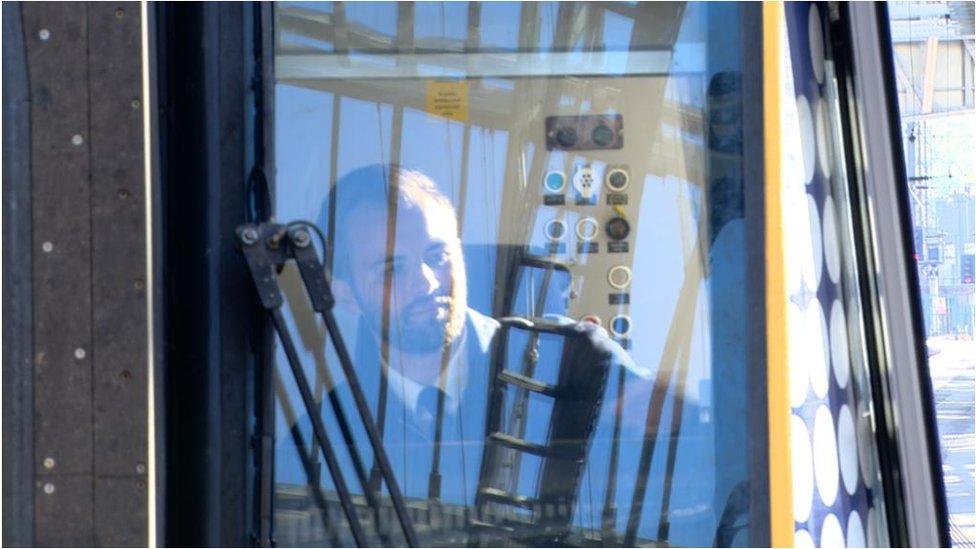Commuter disruption as ScotRail workers out on strike
- Published
Rail passengers are facing disruption during the first day of planned strikes by the RMT union
Commuters faced travel disruption as ScotRail workers began the first of a series of planned one-day strikes.
They walked out in a dispute over proposals to operate more trains without guards.
Traffic Scotland warned traffic was "much heavier than normal this morning due to the rail strike" and congestion in Edinburgh city centre caused disruption to tram journeys.
ScotRail estimated about 30% of its services were unable to run.
Tens of thousands of passengers were thought to have been affected.
A total of 15 routes, including Glasgow to Inverness and Edinburgh to Aberdeen, were cancelled while the frequency of other services were cut in half.
An Edinburgh Trams spokesman said there were "significant delays" caused by city-centre congestion and services were shortened.
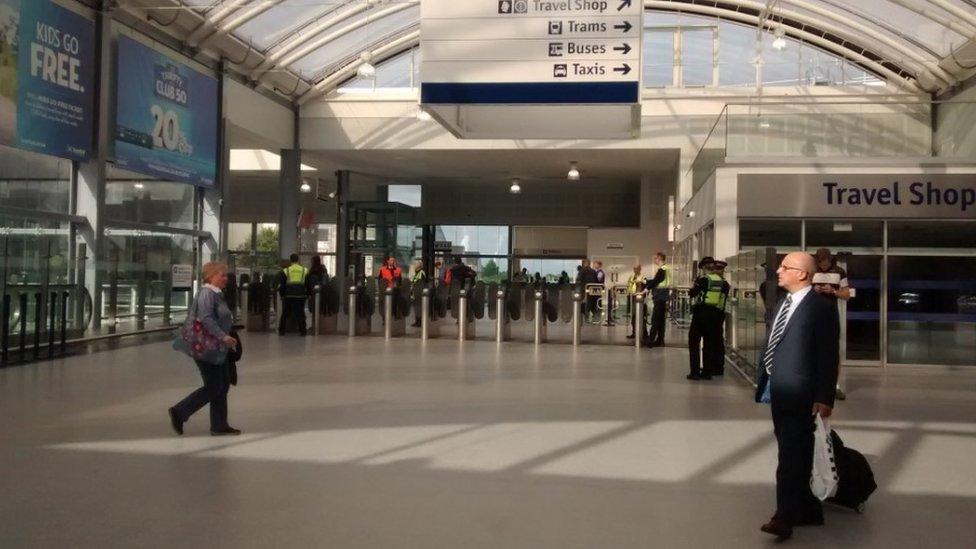
Haymarket Station in Edinburgh was left deserted on Tuesday morning
The strike follows the breakdown of talks aimed at averting walkouts, which officially began just after midnight.
The RMT union insisted the dispute was about "ensuring that Scotland's trains run safely".
But ScotRail said the RMT had been running a campaign of "disinformation that doesn't bear any scrutiny".
The dispute centres around driver-only-operation or DOO trains.
This is where the driver is asked to close the doors at stations, instead of the on-board conductor. Drivers have CCTV in the cabs to check people are clear of the doors, but the unions have said this is not safe and passengers will get hurt.
The train operator has published a list of the services which will be affected by the action, external.
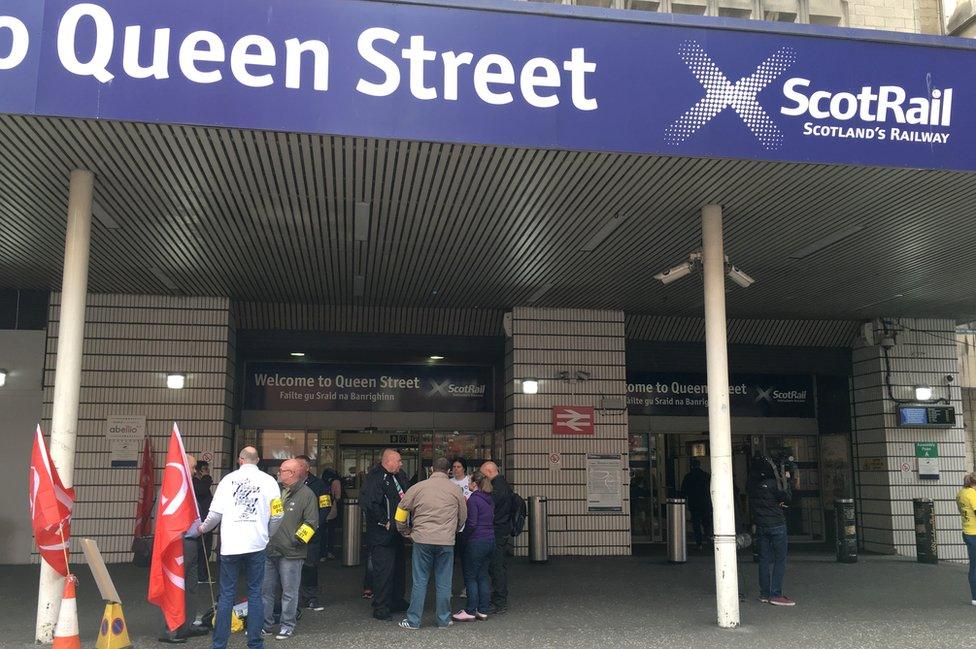
The RMT union said a majority of its members had voted for strike action
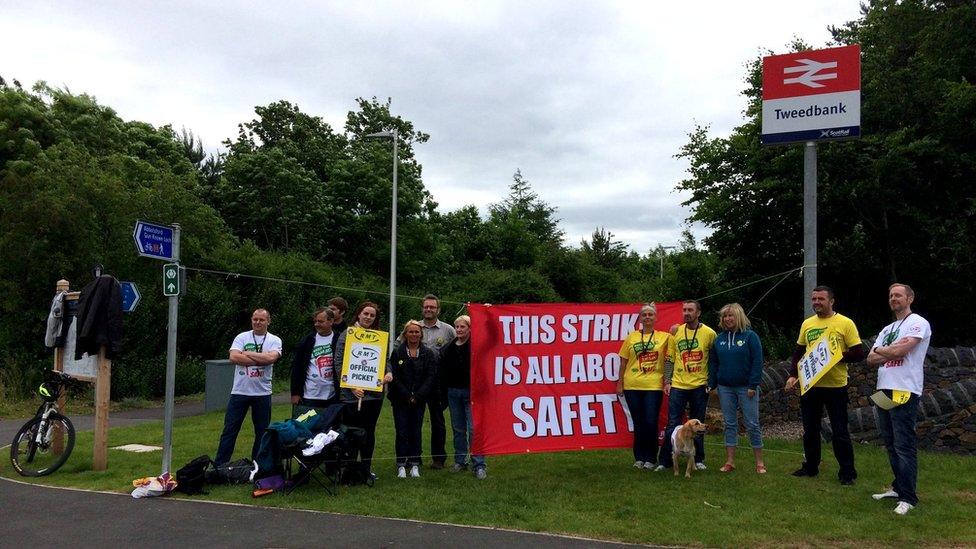
The union announced the dates of a series of six planned walkouts after saying a majority of its members had voted for strike action in a ballot with a 75% turnout.
A similar strike will go ahead in England after Southern Rail staff backed a walkout.
The RMT accused ScotRail of having "no intention of engaging in serious talks" after discussions broke down at 11:00 on Monday.
'Needless' action
The union's regional organiser for Scotland, Gordon Martin, said the strike was "clearly about safety".
He told BBC Scotland: "ScotRail are looking to undermine the safety-critical role of the drive [and] introduce ticket examiners who are for revenue protection only.
"They don't always run with ticket examiners on the train, whereas a train with a guard - the guard must be present.
"You've got revenue protection, the guard opening and closing the doors, the safety of the passengers getting on and off the train and being there if people are distressed in any way. On a ticket examiner-only train, you don't have that facility."
ScotRail said the "needless" strike action would "affect tens of thousands of passengers and hurt hundreds of rail staff".
'Improve and modernise'
Speaking on BBC Radio Scotland, ScotRail's managing director Phil Verster said the company had to "improve and modernise the railway". He also denied that the plans would compromise safety.
"On any other normal day, more than 59% of our services that run in Scotland - and have run like that for 30 years - have a ticket examiner and a driver on the train," he said.
"There are occasions when a ticket examiner does not arrive for work due to sickness and the like and we have got an agreement with the unions - which the RMT and Aslef have signed up to - in those circumstances to run a train."
Mr Verster added that there was "no risk" of job losses or job security for conductors under ScotRail's proposals.

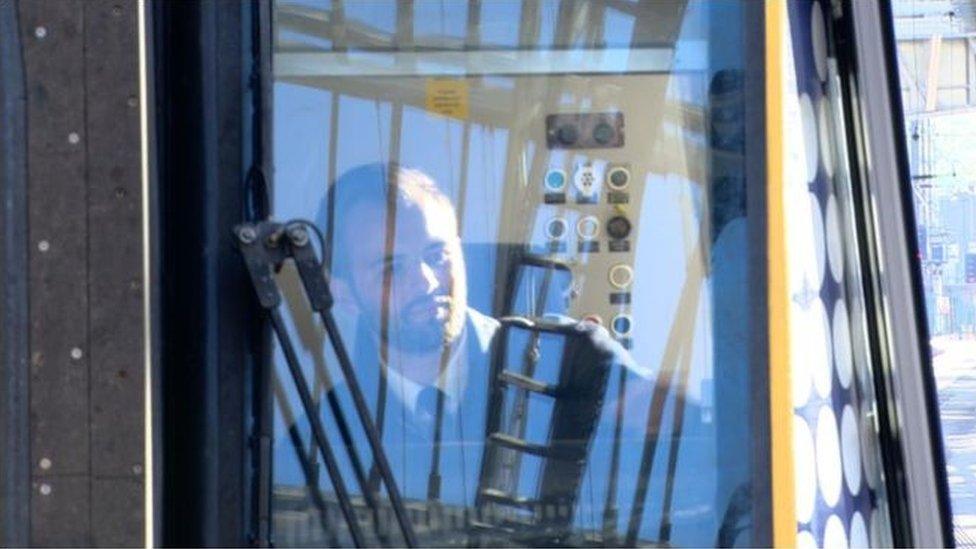
Analysis by Richard Westcott, BBC transport correspondent
Two hugely disruptive strikes, two different trains companies, same issue.
The unions want to draw a line in the sand over something called Driver-only-operation or DOO.
It's where the driver is asked to close the doors at stations, instead of the on-board conductor (guard). Drivers have CCTV in the cabs to check people are clear of the doors, but the unions say it's still not safe and passengers will get hurt.
They're also worried it's a Trojan horse policy to phase out train conductors in future, to save money and cut staff. The companies say they'll keep the conductors on board, they'll just be helping passengers instead.
We've had DOO trains on Britain's railways for decades. The regulator (ORR) says it's happy they are safe and so does the Rail Safety and Standards Board but the unions don't want any more.
It's ScotRail and Southern this time around but this issue could flare up on any number of different lines in future.
People are talking about a "war" on the trains, between the unions on one side, the companies and the government on the other. Neither side wants to budge, and passengers are stuck in the middle.

Scotland's Transport Minister Humza Yousaf said he believed ScotRail would be able to run about 70% of services.
But he said it was inevitable that there would be an impact on passengers.
He said: "We are fully expecting roads to be busier as a result of the rail strike and we are working with partners to do all we can to manage the likely increase in traffic."
"The Scottish government's priority will always be to ensure the safety and efficient running of our railways," he added.
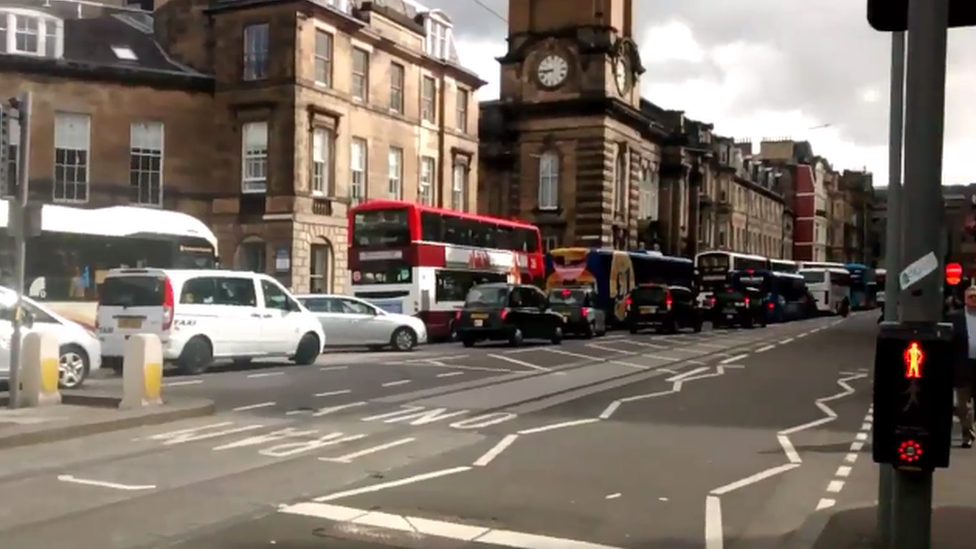
Trams have been unable to access Princes Street in Edinburgh because of the increased volume of traffic
Environmental group Transform Scotland said it was concerned about the disruption that rail passengers would suffer as a result of the RMT's strike action.
Spokesman Paul Tetlaw said: "We want to see modernised and faster rail services that allow ScotRail to provide a service competitive with car journeys.
"This is imperative if we are to get people to switch from using their cars to taking the train.
"Allowing drivers to operate train doors whilst retaining a second staff member on the train will speed up rail services and, as such, appears to us to be a key part of the modernisation process."
- Published20 June 2016
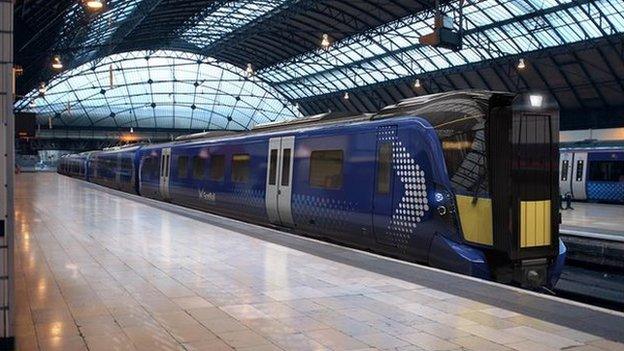
- Published17 June 2016
